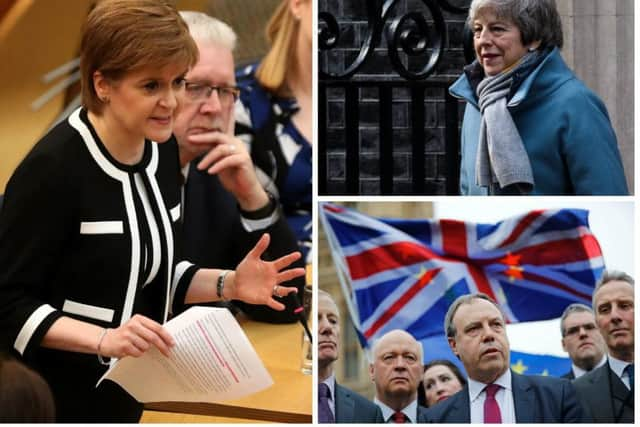Hard recession awaits Scotland if UK crashes out in no-deal Brexit
The Fraser of Allander Institute says last week’s extension of the UK’s EU departure date until 31 October has only “kicked the can down the road”.
There are now fears the unrelenting focus on EU departure has “crowded out” important issues about the key structural changes that Scotland’s economy is now facing.


Advertisement
Hide AdAdvertisement
Hide AdAnd political leaders north of the Border have come under fire as the 20th anniversary of the Scottish Parliament nears over Holyrood’s long-term failure to deliver stronger growth.
A range of scenarios for growth are set out in the institute’s latest economic commentary, from a disorderly Brexit – in which case Scotland is likely to enter recession – to a scenario whereby confidence returns and nearer trend growth is likely.
Fraser of Allander Institute director Professor Graeme Roy said: “Last week’s announcement to move the deadline for the UK’s departure from the EU to October has helped to reduce the imminent threat of a ‘no-deal’ outcome impacting upon the Scottish economy. However, it has only ‘kicked the can down the road’ with little evidence so far of UK policymakers being able to agree a compromise approach. The risks to the economy therefore remain high.
“Moreover the nature of the UK’s withdrawal from the EU is but one step in the process – the negotiations on the terms of the UK’s future relationship with the EU have yet to begin in earnest.”
The institute’s central forecast, based on an orderly departure at some point this year, puts growth at 1.1 per cent in 2019, and 1.4 per cent and 1.5 per cent for 2020 and 2021 respectively.
However, in the event of a no-deal Brexit with no policy response from government, the economy could contract by 2.1 per cent this year as a result of the economic shock, then by 1.5 per cent again next year, before growth returns in 2021 of 1.4 per cent.
“Even if there is a “maximum” policy response, it would result in negative growth of 0.2 per cent this year and a 0.3 per cent contraction the following year.
The UK government is in talks with the Labour Party in a bid to find a compromise Brexit deal that can command support of a majority of MPs. But no agreement has yet been struck and disgruntled Tories are already agitating to oust Prime Minister Theresa May. A replacement hardline Brexiteer such as Boris Johnson would make a no-deal Brexit more likely.
Advertisement
Hide AdAdvertisement
Hide AdThe report shows economic growth has remained steady over the course of 2018, with growth being fairly broad based, employment at a near record high and unemployment at a record low.
However, earnings and productivity growth remain weak, which presents challenges for Scotland’s long-term prospects.
Prof Roy also delivered a withering assessment of Holyrood’s record on the economy in Scotland. He said: “Next month will mark 20 years since the first elections to the Scottish Parliament and despite progress in some areas, the growth challenge is arguably still something that remains inadequately addressed in the political discourse in Scotland.
“Key government targets on the economy, including in growth, exports and productivity, have all been missed. One particular area of concern for the Scottish Government is the emerging outlook for some of Scotland’s devolved tax revenues, which suggests that revenues may have performed worse than forecast in recent years.”
John Macintosh, a tax partner at Deloitte, said: “There is a pressing need to encourage investment and to improve productivity. This should increase our long-term growth.”
Economy secretary Derek Mackay said: “We agree with the Fraser of Allander Institute that the ongoing uncertainty over Brexit continues to divert attention and resources away from the wider economic issues facing our country.
“It is clear that there is a great deal at stake for every business and their voices must be listened to before irreversible decisions are taken.”
